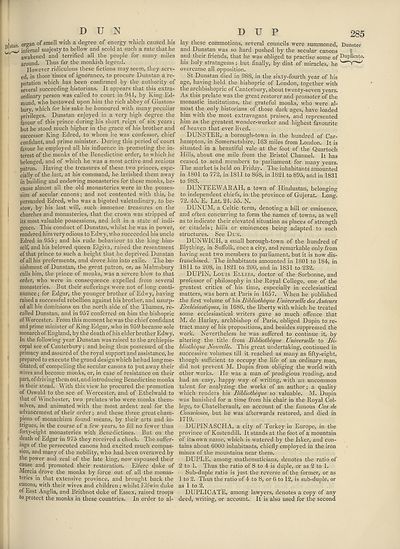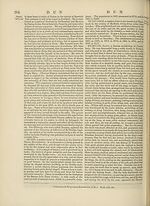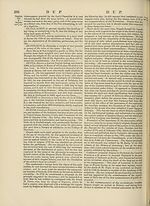Encyclopaedia Britannica > Volume 8, DIA-England
(295) Page 285
Download files
Complete book:
Individual page:
Thumbnail gallery: Grid view | List view

DUN
stan organ of smell with a degree of energy which caused his
infernal majesty to bellow and scold at such a rate that he
W awakened and terrified all the people for many miles
around. Thus far the monkish legend.
However ridiculous these fictions may seem, they serv¬
ed, in those times of ignorance, to procure Dunstan a re¬
putation which has been confirmed by the authority of
several succeeding historians. It appears that this extra¬
ordinary person was called to court in 941, by King Ed¬
mund, who bestowed upon him the rich abbey of Glaston¬
bury, which for his- sake he honoured with many peculiar
privileges. Dunstan enjoyed in a very high degree the
favour of this prince during his short reign of six years;
but he stood much higher in the grace of his brother and
successor King Edred, to whom he was confessor, chief
confidant, and prime minister. During this period of court
favour he employed all his influence in promoting the in¬
terest of the monks of the Benedictine order, to which he
belonged, and of which he was a most active and zealous
patron. Having the treasures of these two princes, espe¬
cially of the last, at his command, he lavished them away
in building and endowing monasteries for these monks, be¬
cause almost all the old monasteries were in the posses¬
sion of secular canons; and not contented with this, he
persuaded Edred, who was a bigoted valetudinary, to be¬
stow, by his last will, such immense treasures on the
churches and monasteries, that the crown was stripped of
its most valuable possessions, and left in a state of indi¬
gence. This conduct of Dunstan, whilst he was in power,
rendered him very odious to Edwy, who succeeded his uncle
Edred in 955; and his rude behaviour to the king him¬
self, and his beloved queen Elgiva, raised the resentment
of that prince to such a height that he deprived Dunstan
of all his preferments, and drove him into exile. The ba¬
nishment of Dunstan, the great patron, or, as Malmsbury
calls him, the prince of monks, was a severe blow to that
order, who were in consequence expelled from several
monasteries. But their sufferings were not of long conti¬
nuance ; for Edgar, the younger brother of Edwy, having
raised a successful rebellion against his brother, and usurp¬
ed all his dominions on the north side of the Thames, re¬
called Dunstan, and in 957 conferred on him the bishopric
of Worcester. From this moment he was the chief confidant
and prime minister of King Edgar, w ho in 959 became sole
monarch of England, by the death ofhis elder brother Edwy.
In the following year Dunstan was raised to the archiepis-
copal see of Canterbury; and being thus possessed of the
primacy and assured of the royal support and assistance, he
prepared to execute the grand design which he had long me¬
ditated, of compelling the secular canons to put away their
wives and become monks, or, in case of resistance on their
part, of driving them out, and introducing Benedictine monks
in their stead. With this view- he procured the promotion
of Osw-ald to the see of Worcester, and of Ethelwald to
that of Winchester, two prelates who were monks them¬
selves, and animated with the most ardent zeal for the
advancement of their order; and these three great cham¬
pions of monachism found means, by their arts and in¬
trigues, in the course of a few years, to fill no fewer than
forty-eight monasteries with Benedictines. But on the
death of Edgar in 975 they received a check. The suffer¬
ings of the persecuted canons had excited much compas¬
sion, and many of the nobility, who had been overaw-ed by
the power and zeal of the late king, now espoused their
cause and promoted their restoration. Elferc duke of
Mercia drove the monks by force out of all the monas¬
teries in that extensive province, and brought back the
canons, with their wives and children; whilst Elfwin duke
of East Anglia, and Brithnot duke of Essex, raised troops
to protect the monks in these countries. In order to al-
D u p 2S5
lay these commotions, several councils were summoned, Dunster
and Dunstan was so hard pushed by the secular canons II
and their friends, that he was obliged to practise some of Duplicate,
his holy stratagems; but finally, by dint of miracles, he
overcame all opposition.
St Dunstan died in 988, in the sixty-fourth year of his
age, having held the bishopric of London, together with
the archbishopric of Canterbury, about twenty-seven years.
As this prelate was the great restorer and promoter of the
monastic institutions, the grateful monks, who were al¬
most the only historians of those dark ages, have loaded
him with the most extravagant praises, and represented
him as the greatest wonder-worker and highest favourite
of heaven that ever lived.
DUNSTER, a borough-town in the hundred of Car-
hampton, in Somersetshire, 163 miles from London. It is
situated in a beautiful vale at the foot of the Quartoch
Hills, about one mile from the Bristol Channel. It has
ceased to send members to parliament for many years.
The market is held on Friday. The inhabitants amounted
in 1801 to 772, in 1811 to 868, in 1821 to 895, and in 1831
to 983.
DUNTEEW^ARAH, a town of Hindustan, belonging
to independent chiefs, in the province of Gujerat. Long.
72. 45. E. Lat. 24. 55. N.
DUNUM, a Celtic term, denoting a hill or eminence,
and often concurring to form the names of towns, as well
as to indicate their elevated situation as places of strength
or citadels; hills or eminences being adapted to such
structures. See Dun.
DUNWICH, a small borough-town of the hundred of
Blything, in Suffolk, once a city, and remarkable only from
having sent two members to parliament, but it is now dis¬
franchised. The inhabitants amounted in 1801 to 184, in
1811 to 208, in 1821 to 200, and in 1831 to 232.
DUPIN, Louis Ellies, doctor of the Sorbonne, and
professor of philosophy in the Royal College, one of the
greatest critics of his time, especially in ecclesiastical
matters, was born at Paris in 1657. When he published
the first volume of his Biblioth&que Universelle des Auteurs
Ecclesiastiques, in 1686, the liberty with which he treated
some ecclesiastical writers gave so much offence that
M. de Harlay, archbishop of Paris, obliged Dupin to re¬
tract many of his propositions, and besides suppressed the
work. Nevertheless he was suffered to continue it, by
altering the title from Bibliotheque Universelle to Bi-
bliotheque Nouvelle. This great undertaking, continued in
successive volumes till it reached as many as fifty-eight,
though sufficient to occupy the life of an ordinary man,
did not prevent M. Dupin from obliging the world with
other works. He was a man of prodigious reading, and
had an easy, happy way of writing, with an uncommon
talent for analyzing the works of an author; a quality
which renders his Bibliotheque so valuable. M. Dupin
was banished for a time from his chair in the Royal Col¬
lege, to Chatelherault, on account of the famous Cas de
Conscience, but he was afterwards restored, and died in
1719.
DUPINASCHA, a city of Turkey in Europe, in the
province of Kostendill. It stands at the foot of a mountain
of its* own name, which is watered by the Isker, and con¬
tains about 6000 inhabitants, chiefly employed in the iron
mines of the mountains near them.
DUPLE, among mathematicians, denotes the ratio of
2 to 1. Thus the ratio of 8 to 4 is duple, or as 2 to 1.
Sub-duple ratio is just the reverse of the former, or as
1 to 2. Thus the ratio of 4 to 8, or 6 to 12, is sub-duple, or
as 1 to 2.
DUPLICATE, among lawyers, denotes a copy of any
deed, writing, or account. It is also used for the second
stan organ of smell with a degree of energy which caused his
infernal majesty to bellow and scold at such a rate that he
W awakened and terrified all the people for many miles
around. Thus far the monkish legend.
However ridiculous these fictions may seem, they serv¬
ed, in those times of ignorance, to procure Dunstan a re¬
putation which has been confirmed by the authority of
several succeeding historians. It appears that this extra¬
ordinary person was called to court in 941, by King Ed¬
mund, who bestowed upon him the rich abbey of Glaston¬
bury, which for his- sake he honoured with many peculiar
privileges. Dunstan enjoyed in a very high degree the
favour of this prince during his short reign of six years;
but he stood much higher in the grace of his brother and
successor King Edred, to whom he was confessor, chief
confidant, and prime minister. During this period of court
favour he employed all his influence in promoting the in¬
terest of the monks of the Benedictine order, to which he
belonged, and of which he was a most active and zealous
patron. Having the treasures of these two princes, espe¬
cially of the last, at his command, he lavished them away
in building and endowing monasteries for these monks, be¬
cause almost all the old monasteries were in the posses¬
sion of secular canons; and not contented with this, he
persuaded Edred, who was a bigoted valetudinary, to be¬
stow, by his last will, such immense treasures on the
churches and monasteries, that the crown was stripped of
its most valuable possessions, and left in a state of indi¬
gence. This conduct of Dunstan, whilst he was in power,
rendered him very odious to Edwy, who succeeded his uncle
Edred in 955; and his rude behaviour to the king him¬
self, and his beloved queen Elgiva, raised the resentment
of that prince to such a height that he deprived Dunstan
of all his preferments, and drove him into exile. The ba¬
nishment of Dunstan, the great patron, or, as Malmsbury
calls him, the prince of monks, was a severe blow to that
order, who were in consequence expelled from several
monasteries. But their sufferings were not of long conti¬
nuance ; for Edgar, the younger brother of Edwy, having
raised a successful rebellion against his brother, and usurp¬
ed all his dominions on the north side of the Thames, re¬
called Dunstan, and in 957 conferred on him the bishopric
of Worcester. From this moment he was the chief confidant
and prime minister of King Edgar, w ho in 959 became sole
monarch of England, by the death ofhis elder brother Edwy.
In the following year Dunstan was raised to the archiepis-
copal see of Canterbury; and being thus possessed of the
primacy and assured of the royal support and assistance, he
prepared to execute the grand design which he had long me¬
ditated, of compelling the secular canons to put away their
wives and become monks, or, in case of resistance on their
part, of driving them out, and introducing Benedictine monks
in their stead. With this view- he procured the promotion
of Osw-ald to the see of Worcester, and of Ethelwald to
that of Winchester, two prelates who were monks them¬
selves, and animated with the most ardent zeal for the
advancement of their order; and these three great cham¬
pions of monachism found means, by their arts and in¬
trigues, in the course of a few years, to fill no fewer than
forty-eight monasteries with Benedictines. But on the
death of Edgar in 975 they received a check. The suffer¬
ings of the persecuted canons had excited much compas¬
sion, and many of the nobility, who had been overaw-ed by
the power and zeal of the late king, now espoused their
cause and promoted their restoration. Elferc duke of
Mercia drove the monks by force out of all the monas¬
teries in that extensive province, and brought back the
canons, with their wives and children; whilst Elfwin duke
of East Anglia, and Brithnot duke of Essex, raised troops
to protect the monks in these countries. In order to al-
D u p 2S5
lay these commotions, several councils were summoned, Dunster
and Dunstan was so hard pushed by the secular canons II
and their friends, that he was obliged to practise some of Duplicate,
his holy stratagems; but finally, by dint of miracles, he
overcame all opposition.
St Dunstan died in 988, in the sixty-fourth year of his
age, having held the bishopric of London, together with
the archbishopric of Canterbury, about twenty-seven years.
As this prelate was the great restorer and promoter of the
monastic institutions, the grateful monks, who were al¬
most the only historians of those dark ages, have loaded
him with the most extravagant praises, and represented
him as the greatest wonder-worker and highest favourite
of heaven that ever lived.
DUNSTER, a borough-town in the hundred of Car-
hampton, in Somersetshire, 163 miles from London. It is
situated in a beautiful vale at the foot of the Quartoch
Hills, about one mile from the Bristol Channel. It has
ceased to send members to parliament for many years.
The market is held on Friday. The inhabitants amounted
in 1801 to 772, in 1811 to 868, in 1821 to 895, and in 1831
to 983.
DUNTEEW^ARAH, a town of Hindustan, belonging
to independent chiefs, in the province of Gujerat. Long.
72. 45. E. Lat. 24. 55. N.
DUNUM, a Celtic term, denoting a hill or eminence,
and often concurring to form the names of towns, as well
as to indicate their elevated situation as places of strength
or citadels; hills or eminences being adapted to such
structures. See Dun.
DUNWICH, a small borough-town of the hundred of
Blything, in Suffolk, once a city, and remarkable only from
having sent two members to parliament, but it is now dis¬
franchised. The inhabitants amounted in 1801 to 184, in
1811 to 208, in 1821 to 200, and in 1831 to 232.
DUPIN, Louis Ellies, doctor of the Sorbonne, and
professor of philosophy in the Royal College, one of the
greatest critics of his time, especially in ecclesiastical
matters, was born at Paris in 1657. When he published
the first volume of his Biblioth&que Universelle des Auteurs
Ecclesiastiques, in 1686, the liberty with which he treated
some ecclesiastical writers gave so much offence that
M. de Harlay, archbishop of Paris, obliged Dupin to re¬
tract many of his propositions, and besides suppressed the
work. Nevertheless he was suffered to continue it, by
altering the title from Bibliotheque Universelle to Bi-
bliotheque Nouvelle. This great undertaking, continued in
successive volumes till it reached as many as fifty-eight,
though sufficient to occupy the life of an ordinary man,
did not prevent M. Dupin from obliging the world with
other works. He was a man of prodigious reading, and
had an easy, happy way of writing, with an uncommon
talent for analyzing the works of an author; a quality
which renders his Bibliotheque so valuable. M. Dupin
was banished for a time from his chair in the Royal Col¬
lege, to Chatelherault, on account of the famous Cas de
Conscience, but he was afterwards restored, and died in
1719.
DUPINASCHA, a city of Turkey in Europe, in the
province of Kostendill. It stands at the foot of a mountain
of its* own name, which is watered by the Isker, and con¬
tains about 6000 inhabitants, chiefly employed in the iron
mines of the mountains near them.
DUPLE, among mathematicians, denotes the ratio of
2 to 1. Thus the ratio of 8 to 4 is duple, or as 2 to 1.
Sub-duple ratio is just the reverse of the former, or as
1 to 2. Thus the ratio of 4 to 8, or 6 to 12, is sub-duple, or
as 1 to 2.
DUPLICATE, among lawyers, denotes a copy of any
deed, writing, or account. It is also used for the second
Set display mode to:
![]() Universal Viewer |
Universal Viewer | ![]() Mirador |
Large image | Transcription
Mirador |
Large image | Transcription
Images and transcriptions on this page, including medium image downloads, may be used under the Creative Commons Attribution 4.0 International Licence unless otherwise stated. ![]()
| Encyclopaedia Britannica > Encyclopaedia Britannica > Volume 8, DIA-England > (295) Page 285 |
|---|
| Permanent URL | https://digital.nls.uk/193326840 |
|---|
| Attribution and copyright: |
|
|---|
| Description | Ten editions of 'Encyclopaedia Britannica', issued from 1768-1903, in 231 volumes. Originally issued in 100 weekly parts (3 volumes) between 1768 and 1771 by publishers: Colin Macfarquhar and Andrew Bell (Edinburgh); editor: William Smellie: engraver: Andrew Bell. Expanded editions in the 19th century featured more volumes and contributions from leading experts in their fields. Managed and published in Edinburgh up to the 9th edition (25 volumes, from 1875-1889); the 10th edition (1902-1903) re-issued the 9th edition, with 11 supplementary volumes. |
|---|---|
| Additional NLS resources: |
|

